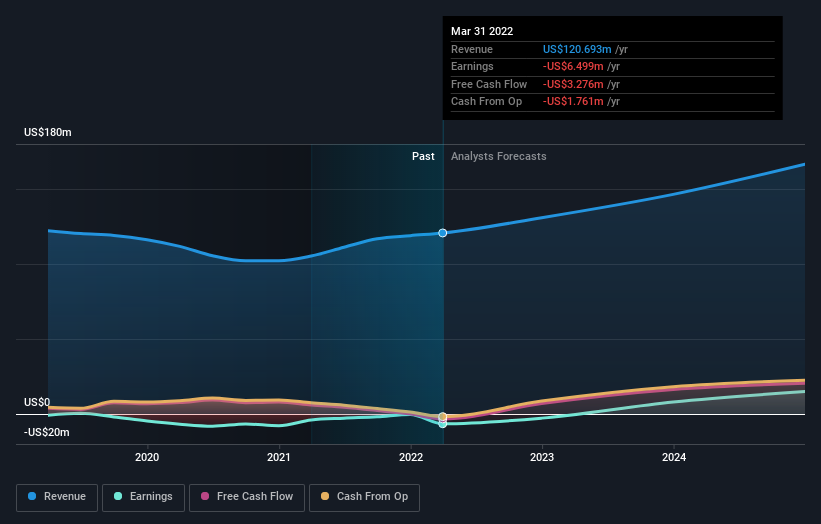Investing in Harvard Bioscience (NASDAQ:HBIO) three years ago would have delivered you a 65% gain
Harvard Bioscience, Inc. (NASDAQ:HBIO) shareholders might understandably be very concerned that the share price has dropped 30% in the last quarter. But over three years, the returns would have left most investors smiling After all, the share price is up a market-beating 65% in that time.
Now it's worth having a look at the company's fundamentals too, because that will help us determine if the long term shareholder return has matched the performance of the underlying business.
Check out our latest analysis for Harvard Bioscience
Harvard Bioscience wasn't profitable in the last twelve months, it is unlikely we'll see a strong correlation between its share price and its earnings per share (EPS). Arguably revenue is our next best option. When a company doesn't make profits, we'd generally expect to see good revenue growth. That's because fast revenue growth can be easily extrapolated to forecast profits, often of considerable size.
Harvard Bioscience actually saw its revenue drop by 1.1% per year over three years. The revenue growth might be lacking but the share price has gained 18% each year in that time. Unless the company is going to make profits soon, we would be pretty cautious about it.
You can see how earnings and revenue have changed over time in the image below (click on the chart to see the exact values).
It's good to see that there was some significant insider buying in the last three months. That's a positive. That said, we think earnings and revenue growth trends are even more important factors to consider. If you are thinking of buying or selling Harvard Bioscience stock, you should check out this free report showing analyst profit forecasts.
A Different Perspective
While the broader market lost about 10% in the twelve months, Harvard Bioscience shareholders did even worse, losing 46%. However, it could simply be that the share price has been impacted by broader market jitters. It might be worth keeping an eye on the fundamentals, in case there's a good opportunity. Longer term investors wouldn't be so upset, since they would have made 9%, each year, over five years. It could be that the recent sell-off is an opportunity, so it may be worth checking the fundamental data for signs of a long term growth trend. It's always interesting to track share price performance over the longer term. But to understand Harvard Bioscience better, we need to consider many other factors. For instance, we've identified 2 warning signs for Harvard Bioscience that you should be aware of.
If you like to buy stocks alongside management, then you might just love this free list of companies. (Hint: insiders have been buying them).
Please note, the market returns quoted in this article reflect the market weighted average returns of stocks that currently trade on US exchanges.
Have feedback on this article? Concerned about the content? Get in touch with us directly. Alternatively, email editorial-team (at) simplywallst.com.
This article by Simply Wall St is general in nature. We provide commentary based on historical data and analyst forecasts only using an unbiased methodology and our articles are not intended to be financial advice. It does not constitute a recommendation to buy or sell any stock, and does not take account of your objectives, or your financial situation. We aim to bring you long-term focused analysis driven by fundamental data. Note that our analysis may not factor in the latest price-sensitive company announcements or qualitative material. Simply Wall St has no position in any stocks mentioned.


